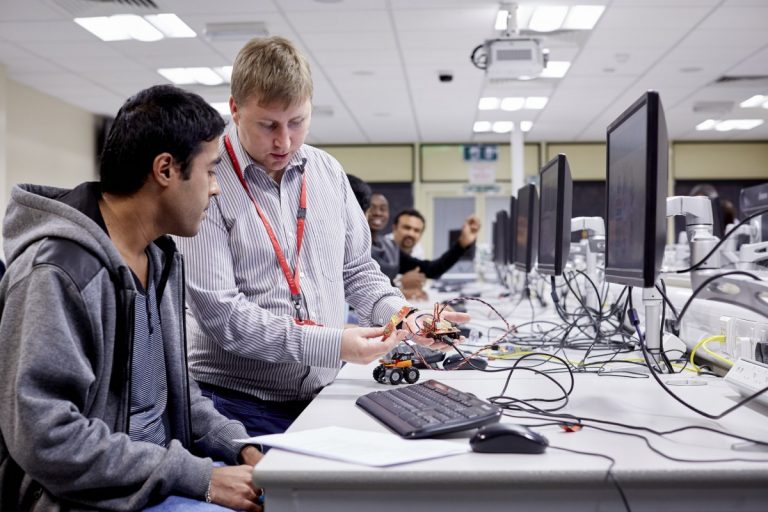
As we recover from one of the biggest international cyberattacks the world has ever seen, never has the role of Computer Science been more relevant or pressing.
We live in a digital age full of opportunity and potential, and there is no chance of it abating anytime soon. Computers already infiltrate every aspect of our everyday lives, so we need computer scientists to theorise, design, develop, and apply the software and hardware for the programmes we use, as well as to offer protection for any future attacks.
We’re only just scratching the surface of the potential of computers and the benefits we as a society are able to gain from them. Computer scientists are at the forefront of uncovering this, not only seeking solutions to new problems, but also striving to improve the current solutions that exist. These people push for the results that make our lives easier and more efficient, whether this be in healthcare, education, finance or engineering.
Due to the proliferation of computers throughout society, computer scientists are needed in virtually every field. This high demand gives students the freedom to work all over the world, enjoying excellent graduate prospects upon completion of their studies.

Image courtesy of the Royal Holloway, University of London
The Complete University Guide‘s ranking of Computer Science universities shows the fantastic prospects Computer Science graduates can expect, with the top 10 UK universities averaging 93.6 percent of graduates either professionally employed or in further study within six months of leaving university.
There’s no denying that the reach of Computer Science is extensive. Almost every aspect of society relies on the industry’s innovations, whether it’s a small family business in need of digital protection, or a charity that needs a new interface to streamline its donations, a career in Computer Science gives you the chance to create real material change for good in the world around you.
Here are 4 UK universities that will help you make an impact in Computer Science…
SCHOOL OF COMPUTER SCIENCE AND TECHNOLOGY, UNIVERSITY OF BEDFORDSHIRE
The School of Computer Science and Technology at the University of Bedfordshire prides itself on creating the scientists and engineers of tomorrow. The School’s outstanding teaching is driven by its strong research base in which they engage researchers at the top of their field.
The Institute for Research in Applicable Computing, the hub for research at the School, is comprised of four centres dedicated to specific fields that create practical solutions for real-world problems. These include the National Centre for Cyberstalking Research, which was set-up to address the need for research and analysis of the increased threat to individuals and society from this very modern-day trend.

Image courtesy of the University of Bedfordshire
Other Centres include the Centre for Sensing, Signals and Wireless Technologies, the Centre for Robotics and Smart Information System Studies, and the Centre for Visualisation and Data Analytics. At all of these, research students work alongside staff to produce innovations that go on to impact business, community and society at large.
Research students also have the chance to put their knowledge to the test by working in partnership with businesses to optimise their commercial success, or even test out new beneficial technologies.
The School offers an incredibly broad range of undergraduate and postgraduate courses in the Computer Science field, all of which make the most of the world-class facilities available, such as the Graphical and Games Development labs, and the iMac suite.
SCHOOL OF COMPUTER SCIENCE, UNIVERSITY OF NOTTINGHAM
The School of Computer Science at the University of Nottingham is a world leader in research and home to state-of-the-art facilities. Teamed with its exceptional teaching and friendly, modern and supportive environment, this School’s winning formula is unparalleled.
The institution ranked ninth in the UK for research power, according to the latest Research Excellence Framework, with 88 percent of its research activity classified as being world-leading or internationally-excellent, and the research environment received the second-best rating in UK Computer Science.
Their world-class research tackles difficult real-world problems that often have significant impact on industry, commerce and the public; preparing graduates for a world in which they can make a difference and use their skills to better the world.
Research is organised through seven groups covering a diverse range of interdisciplinary fields. These include the Mixed Reality Laboratory, Intelligent Modelling and Analysis, and Automated Scheduling, Optimisation and Planning Group.
The School’s links with big players in the field such as Adobe Systems, Google, Microsoft and IBM offers students the opportunity to pursue an optional year in industry to learn from the best, allowing them to cultivate relationships that serve them well long after graduation.
SCHOOL OF ELECTRONICS, ELECTRICAL ENGINEERING AND COMPUTER SCIENCE (EEECS), QUEENS UNIVERSITY BELFAST
Since Northern Ireland is home to more software companies than any other part of the UK besides London, proactive engagement with industry is a central part of the course at the School of EEECS. Students can choose both undergraduate and postgraduate studies that include a year in industry.
Work placements with business leaders are also on offer as the School has links with over 500 companies in Ireland, as well as the UK and abroad – including BT, Schrader, NYSE and Citi.

Image courtesy of Queen’s University Belfast
It is this hands-on approach and Queen’s fantastic reputation as one of the leading universities in the UK that means graduates of EEECS enjoy an extremely high employment rate, with 89 percent finding graduate-level jobs within six months of graduation.
The School’s recent multi-million-pound refurbishment makes it a global hub for Computer Science study. The state-of-the-art facilities mean that students have access to some of the best technologies, with laboratories for Microelectronics, Electronics, Communications, Circuits, and Instrumentation to Virtual Reality, Software Engineering, Power, and Machines.
The School is also home to the Centre for Secure Information Technologies, the largest university cybersecurity research lab in the UK, ensuring student’s work is going towards making the digital world a safer place for all.
DEPARTMENT OF COMPUTER SCIENCE, ROYAL HOLLOWAY UNIVERSITY OF LONDON
The Department of Computer Science at Royal Holloway covers the advanced subject matters of the Computer Science field. Students can take on pioneering projects in areas like artificial intelligence, in which you can learn topics such as Deep Learning used by Google’s DeepMind, or tackle modules that teach you how to connect billions of devices in The Internet of Things (IoT).
Each of the Department’s single-honours degree programmes give students the opportunity to spend one year working in the industry, significantly improving their chances of employment upon graduation, with many being hired by the very company they pursued a placement with.
This valuable work experience takes place in software developing companies, or in those that specialise in applications areas like consulting, health or finance. Past placements have included Accenture, Rolls-Royce, Goldman Sachs, CGI, and Siemens, just to name a few.
The Department also teams up with business as part of its research programmes, specialising in areas that are at the centre of the transformations IT is bringing to society and the economy, including Big Data and IoT – algorithms, artificial intelligence, cloud computing, distributed systems, and machine learning.
*Some of the institutions featured in this article are commercial partners of Study International
Liked this? Then you’ll love these…
The evolution of Computer Science in higher education
No Man’s Sky is not the limit: The infinite possibilities of a career in game development







